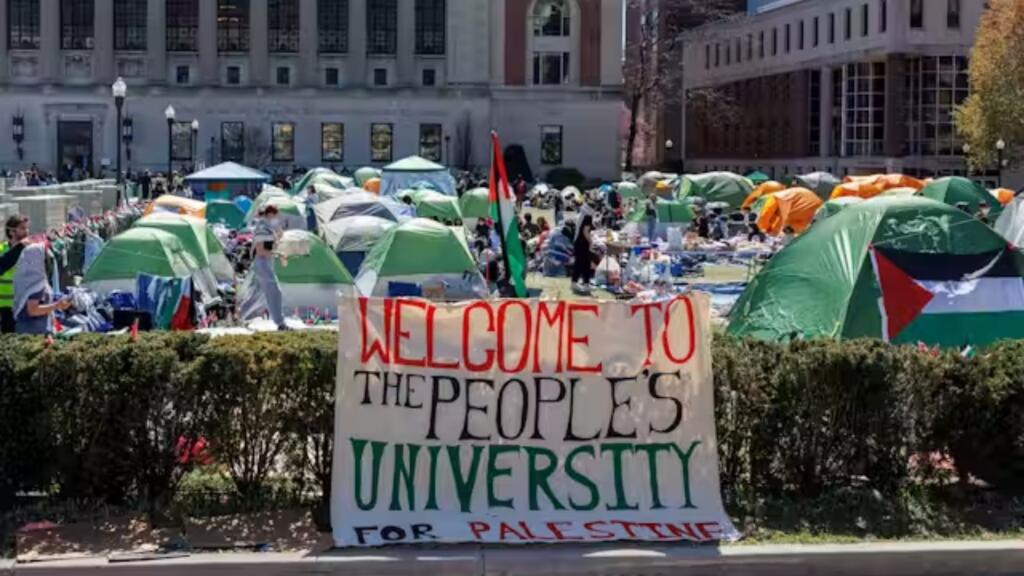In recent years, protests on college campuses have become emblematic of the struggle between freedom of expression and maintaining public order. The ongoing demonstrations at US universities regarding the Israeli-Palestinian conflict have reignited this debate, drawing attention from international observers, including India. India’s diplomatic response underscores the need for a delicate balance between expressing dissent and ensuring public safety, reflecting a nuanced understanding of democratic principles.
The Dynamics of the Protests
The protests at US universities, particularly regarding the Israeli military operations in Gaza, have been marked by passionate demonstrations and contentious debates. Supporters of the Palestinian cause have mobilized in solidarity, while pro-Israel groups have voiced their concerns and opposition.
Accusations of antisemitism have surfaced amid the protests, raising legitimate concerns about the safety and well-being of Jewish students on campus. While many protest organizers assert their commitment to peaceful activism, reports of antisemitic rhetoric and harassment cannot be ignored. The intersectionality of activism, where solidarity with one cause may inadvertently perpetuate discrimination against another, underscores the complexity of navigating social justice movements.
However, amidst the fervor of activism, accusations of antisemitism and instances of violence have emerged, complicating the narrative of free expression. The clash between opposing viewpoints has created a tense atmosphere on campuses, raising questions about the limits of protest and the responsibilities of activists.
Also Read: Jaishankar’s Play-by-play to US: Read India’s History Before Making Despicable Remarks
Challenges to Freedom of Expression
While freedom of expression is a cornerstone of democratic societies, its exercise is not without limitations. In the context of the US campus protests, the challenge lies in striking a balance between allowing dissenting voices to be heard and preventing the escalation of tensions.
The presence of antisemitic rhetoric and incidents of violence has prompted calls for universities to intervene and maintain a safe environment for all students. However, this intervention raises questions about censorship and the suppression of unpopular opinions.
As India’s External Affairs Ministry spokesperson, Randhir Jaiswal, noted, there must be a “right balance” between freedom of expression, responsibility, and public safety. Achieving this balance requires careful navigation of competing interests and a commitment to upholding democratic values.
India’s stance on the US campus protests reflects a nuanced understanding of democratic principles. By emphasizing the importance of striking a balance between freedom of expression, responsibility, and public safety, India underscores the universal values that underpin democratic governance. Moreover, India’s call for respecting local laws and regulations resonates with the principle of diplomatic etiquette and mutual respect among nations.
India & The US
The protests at US universities have broader implications for both the US and India, reflecting the challenges of multiculturalism, diversity, and democracy. In the US, the demonstrations highlight the complexities of navigating contentious issues within academic spaces and the need for institutions to foster constructive dialogue while ensuring the safety of their students.
The accusations of antisemitism and concerns about safety underscore the importance of addressing hate speech and intolerance, without compromising on the principles of free speech. For India, the situation serves as a reminder of the importance of upholding democratic values both domestically and internationally.
India’s diplomatic response emphasizes the need for mutual understanding and respect between democracies, recognizing that actions at home reflect on the global stage. As India continues to navigate its own democratic challenges, including issues of free speech and minority rights, its engagement with the US campus protests offers valuable insights into the complexities of democratic governance.
In conclusion, the protests at US universities regarding the Israeli-Palestinian conflict have sparked debates about the limits of freedom of expression and the responsibilities of activists. India’s diplomatic insight underscores the importance of striking a balance between expressing dissent and maintaining public order, reflecting a nuanced understanding of democratic principles.
As the protests continue to unfold, it is essential for stakeholders to engage in constructive dialogue, address concerns about safety and intolerance, and uphold the fundamental values of democracy. By doing so, both the US and India can navigate the complexities of multiculturalism, diversity, and dissent, contributing to a more inclusive and democratic society.
Also Read: When Did the US Start Backstabbing like a Coward? A Critical Examination of Recent Actions
